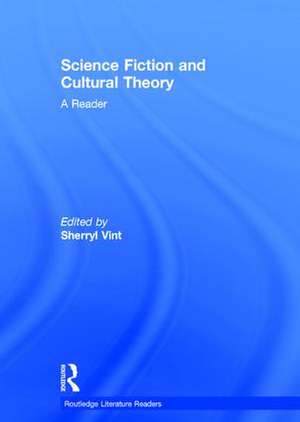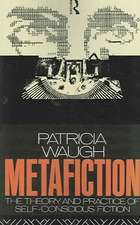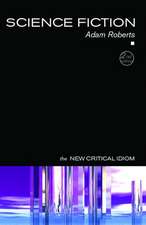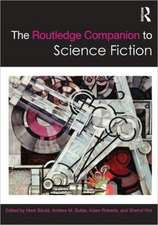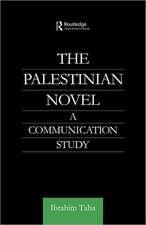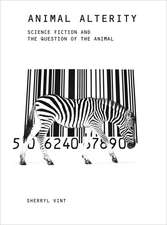Science Fiction and Cultural Theory: A Reader: Routledge Literature Readers
Editat de Sherryl Vinten Limba Engleză Hardback – 26 oct 2015
The book is divided into four parts:
- Gender, Technology and the Body
- The Science-Fictionalization of Everyday Life
- Media, Mediation, Science Fiction
- Posthumanisms
| Toate formatele și edițiile | Preț | Express |
|---|---|---|
| Paperback (1) | 473.20 lei 43-57 zile | |
| Taylor & Francis – 21 oct 2015 | 473.20 lei 43-57 zile | |
| Hardback (1) | 875.55 lei 43-57 zile | |
| Taylor & Francis – 26 oct 2015 | 875.55 lei 43-57 zile |
Preț: 875.55 lei
Preț vechi: 1178.12 lei
-26% Nou
Puncte Express: 1313
Preț estimativ în valută:
167.53€ • 175.39$ • 138.63£
167.53€ • 175.39$ • 138.63£
Carte tipărită la comandă
Livrare economică 07-21 aprilie
Preluare comenzi: 021 569.72.76
Specificații
ISBN-13: 9781138814981
ISBN-10: 1138814989
Pagini: 322
Dimensiuni: 174 x 246 x 27 mm
Greutate: 0.45 kg
Ediția:1
Editura: Taylor & Francis
Colecția Routledge
Seria Routledge Literature Readers
Locul publicării:Oxford, United Kingdom
ISBN-10: 1138814989
Pagini: 322
Dimensiuni: 174 x 246 x 27 mm
Greutate: 0.45 kg
Ediția:1
Editura: Taylor & Francis
Colecția Routledge
Seria Routledge Literature Readers
Locul publicării:Oxford, United Kingdom
Cuprins
Introduction: Semiotic Ghosts and Broken Dreams
Part 1: Gender, Technology and the Body
1. Bodies in Space: Film as Carnal Knowledge, Annette Michelson
2. Typewriter, Friedrich Kittler
3. Horror and the Monstrous Feminine, Barbara Creed
4. Scary Women: Cinema, Surgery and Special Effects, Vivian Sobchack
5. excerpts from Connected: What it Means to Live in Network Society, Steve Shaviro
6. Gendering the Technological Imagination, Anne Balsamo
Part 2: The Science-Fictionalization of Everyday Life
7. Bloodless Transfusions, Manuel De Landa
8. Transplant Medicine and Transformative Narrative, Susan Squier
9. Bioinformatic Bodies and the Problems of ‘Life Itself’, Eugene Thacker
10. A Monstrous Vision: Disney, Science Fiction and Cinemascope, Jay Telotte
11. Everyday Nanowars: Video Games and the Crises of the Digital Battlefield, Colin Milburn
12. Practicing Media Archaeology: Creative Metaphors for Remediation, Jussa Parikka
Part 3: Media, Mediation, Science Fiction
13. The Videology of Science Fiction, Garrett Stewart
14. The Cinema of Attractions, Tom Gunning
15. The Ecstasy of Communication, Jean Baudrillard
16. On a Clear Day You Can See the Horizon of Invisibility: Rethinking Science Fiction Film in the Age of Electronic (Re)Production, Brooks Landon
17. The Wonder Years and Beyond: 1989-1995, Michelle Pierson
18. The Cultural Logic of Media Convergence, Henry Jenkins
Part 4: Posthumanisms
19. The Cyborg Manifesto, Donna Haraway
20. The Life Cycle of Cyborgs, N. Katherine Hayles
21. The Image Virus, Scott Butkatman
22. Meta(l)morphoses, Rosi Braidotti
23. The Transmolecularization of [Black] Folk: Space in the Place, Sun Ra, and Afrofuturism, Nabeel Zuberi
24. When the Machines Stop: Fantasy, Reality and Terminal Identity in Neon Genesis: Evangelion and Serial Experiments: Lain, Susan Napier
Part 1: Gender, Technology and the Body
1. Bodies in Space: Film as Carnal Knowledge, Annette Michelson
2. Typewriter, Friedrich Kittler
3. Horror and the Monstrous Feminine, Barbara Creed
4. Scary Women: Cinema, Surgery and Special Effects, Vivian Sobchack
5. excerpts from Connected: What it Means to Live in Network Society, Steve Shaviro
6. Gendering the Technological Imagination, Anne Balsamo
Part 2: The Science-Fictionalization of Everyday Life
7. Bloodless Transfusions, Manuel De Landa
8. Transplant Medicine and Transformative Narrative, Susan Squier
9. Bioinformatic Bodies and the Problems of ‘Life Itself’, Eugene Thacker
10. A Monstrous Vision: Disney, Science Fiction and Cinemascope, Jay Telotte
11. Everyday Nanowars: Video Games and the Crises of the Digital Battlefield, Colin Milburn
12. Practicing Media Archaeology: Creative Metaphors for Remediation, Jussa Parikka
Part 3: Media, Mediation, Science Fiction
13. The Videology of Science Fiction, Garrett Stewart
14. The Cinema of Attractions, Tom Gunning
15. The Ecstasy of Communication, Jean Baudrillard
16. On a Clear Day You Can See the Horizon of Invisibility: Rethinking Science Fiction Film in the Age of Electronic (Re)Production, Brooks Landon
17. The Wonder Years and Beyond: 1989-1995, Michelle Pierson
18. The Cultural Logic of Media Convergence, Henry Jenkins
Part 4: Posthumanisms
19. The Cyborg Manifesto, Donna Haraway
20. The Life Cycle of Cyborgs, N. Katherine Hayles
21. The Image Virus, Scott Butkatman
22. Meta(l)morphoses, Rosi Braidotti
23. The Transmolecularization of [Black] Folk: Space in the Place, Sun Ra, and Afrofuturism, Nabeel Zuberi
24. When the Machines Stop: Fantasy, Reality and Terminal Identity in Neon Genesis: Evangelion and Serial Experiments: Lain, Susan Napier
Descriere
This book combines key theoretical statements that have become touchstones for work in the field with more recent theoretical inventions that showcase how theoretical paradigms central to science fiction such as posthumanism and mediation have become central to critical theory overall in the twenty-first century
